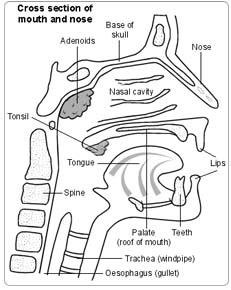What is it?
Polyps are swollen skin, lining the inside of the large air spaces that exist in the bones of the face (the sinuses) or of your nose. They look like small bunches of grapes. They exist in 1 to 4% of people and they are two to four times more frequent in males compared to females. Sometimes polyps are caused by allergy or infection.
 The polyps in your nose are stopping you from breathing easily through your nose. The polyps sometimes block the sinuses in the bones of the face. They make sinus infections more common. In some people, polyps block the part of the nose which helps us to smell. Unfortunately, when this happens, the sense of smell may not to come back after the polyps have been removed. If the polyps are taken out, you will be able to breathe more easily through your nose. You should have less trouble with sinus infections.
The polyps in your nose are stopping you from breathing easily through your nose. The polyps sometimes block the sinuses in the bones of the face. They make sinus infections more common. In some people, polyps block the part of the nose which helps us to smell. Unfortunately, when this happens, the sense of smell may not to come back after the polyps have been removed. If the polyps are taken out, you will be able to breathe more easily through your nose. You should have less trouble with sinus infections.
The Operation
You will have a general anaesthetic and be completely asleep. The operation will be carried out inside the nose. There will be no cuts on the outside of the nose. There will be no change in the shape of your nose. Small instruments will be used inside the nose to take out each polyp which is then sent to the laboratory to be examined under a microscope.
The surgeon will wash out your sinuses to remove any infection that may be trapped inside by the polyps. If there is any bleeding, the surgeon will put cotton gauze (a pack) soaked in Vaseline inside your nose to stop the bleeding, or he may use a dressing like sponge rubber. Sometimes if the nose is very narrow inside, the surgeon may leave plastic splints inside the nose to stop the tissues sticking together when they heal up. Because you are asleep you will not feel any pain at all during the operation. You will probably be fit to go home the day after your operation.
Any Alternatives
If you leave things as they are, the polyps will always get worse. Some tablets and nasal sprays shrink polyps a little. The polyps will always get bigger once the tablets or sprays are stopped. The only way to get rid of polyps is with an operation.
Before the Operation
Stop smoking and get your weight down if you are overweight. (See Healthy Living). If you know that you have problems with your blood pressure, your heart, or your lungs, ask your family doctor to check that these are under control. Check the hospital's advice about taking the Pill or hormone replacement therapy (HRT). Check you have a relative or friend who can come with you to the hospital, take you home, and look after you for the first couple of days after the operation. Sort out any tablets, medicines, inhalers that you are using. Keep them in their original boxes and packets. Bring them to the hospital with you. On the ward, you may be checked for past illnesses and may have special tests to make sure that you are well prepared and that you can have the operation as safely as possible. Please tell the doctors and nurses of any allergies to tablets, medicines or dressings. You will have the operation explained to you and will be asked to fill in an operation consent form. Many hospitals now run special preadmission clinics, where you visit for an hour or two, a few weeks or so before the operation for these checks. If you have a cold in the week before your admission to hospital, please telephone the ward and let the ward sister know. The operation will usually put off, and you will be given time to get better before being sent for again. You will need to get over the cold before the operation can be done because by having an anaesthetic the cold could turn into a serious infection in the chest.
After - In Hospital
You may be given oxygen from a face mask for a few hours if you have had any chest problems in the past. There is usually some pain and discomfort around the nose after this operation. With packing inside your nose, you will have to breathe through your mouth. This will make your mouth feel dry. Take frequent drinks to keep it moist. You may find that the nasal packing will make your eyes water or give you a headache. Ask for painkillers if the pain is not well controlled or if it gets worse. A general anaesthetic may make you slow, clumsy and forgetful for about 24 hours. The nurses will help you with everything you need until you are able to do things for yourself. Do not make important decisions during this time. The next day, when the nurses take the packing from your nose, there will be a little bleeding. This usually stops very quickly. Splints are usually left in place for about two weeks. You will probably be able to go home later the same day. The nurses will check that your nose is comfortable and is not bleeding. You will be given some cream to use inside your nose, together with some nose drops and advice about steam inhalations. Before you leave the ward, you will be given an appointment to attend the ENT (ear, nose, and throat) outpatient clinic for a check-up by the surgeon. The results of the examination of the polyp(s) will be ready by then. The nurses will advise you about sick notes, certificates etc.
After - At Home
Take two painkilling tablets every six hours to control any pain or discomfort in your nose. The nose will feel blocked for 7 to 10 days after your operation, but will gradually improve. Do not blow your nose until two days after you get home, and then start off by blowing it VERY GENTLY. To begin with, you will see blood staining in your handkerchief. Most of this will be old blood from your operation, but there may be a little fresh bleeding as well. If possible, try to avoid catching a cold during your first week at home. If you do get a cold you should see your general practitioner for some antibiotics. Take it easy at home. Do not do anything too energetic during the first few days in case this makes your nose bleed. If you usually do hard physical exercise such as weight training, jogging, keep fit classes, etc. you will be fit enough to return to these activities about two to three weeks after your operation. Any earlier, and there is a risk that you will make your nose bleed. Avoid smoky atmospheres such as pubs and clubs, because cigarette smoke will irritate the inside of the nose. Do not forget to use the cream, steam inhalations and nasal drops. You will be fit to drive as soon as you leave the hospital. You should be able to go back to work one week after your operation. Avoid swimming and diving until you have seen the surgeon in the clinic.
Possible Complications
As with any operation under general anaesthetic, there is a very small risk of complications related to your heart and the lungs. The tests that you will have before the operation will make sure that you can have the operation in the safest possible way and will bring the risk for such complications very close to zero.
If there is a lot of bleeding during your operation, the surgeon may leave the packs inside your nose for an extra day. If there is a lot of bleeding after the packs are removed, then the surgeon will put them back in, either with a local or a general anaesthetic. Sometimes in people with narrow nasal passages, the sides of the nose may stick together as they heal with bands of scarred tissue which are called adhesions. The adhesions can often be freed by the surgeon when he sees you in the outpatient clinic. In some people, polyps can come back again. This may happen within a year, or may occur several years later. It is impossible to say whether your polyps will come back again, only time will tell. As long as you follow the advice above, you are unlikely to have any problems when you get home. There is a small risk that your nose may bleed. If this is just a spot or two you should not worry. If your nose bleeds for more than an hour, come back to the ward.
There is a small risk of infection at the area of the operation. If you develop increasing pain in the cheek bone or the nose, a headache or a temperature, it probably means that an infection is developing and you will need medical attention promptly. Taking antibiotics for a week or two usually solves the problem.
Advanced Reproductive Technology
- In Vitro Fertilisation (IVF)
- Intracytoplasmic Sperm Injection (ICSI)
- Donor egg and embryo programs
- In Vitro Fertilisation (IVF)
- Pre-implantation genetic diagnosis (PGD)
- Surrogacy programs
Dental Videos





